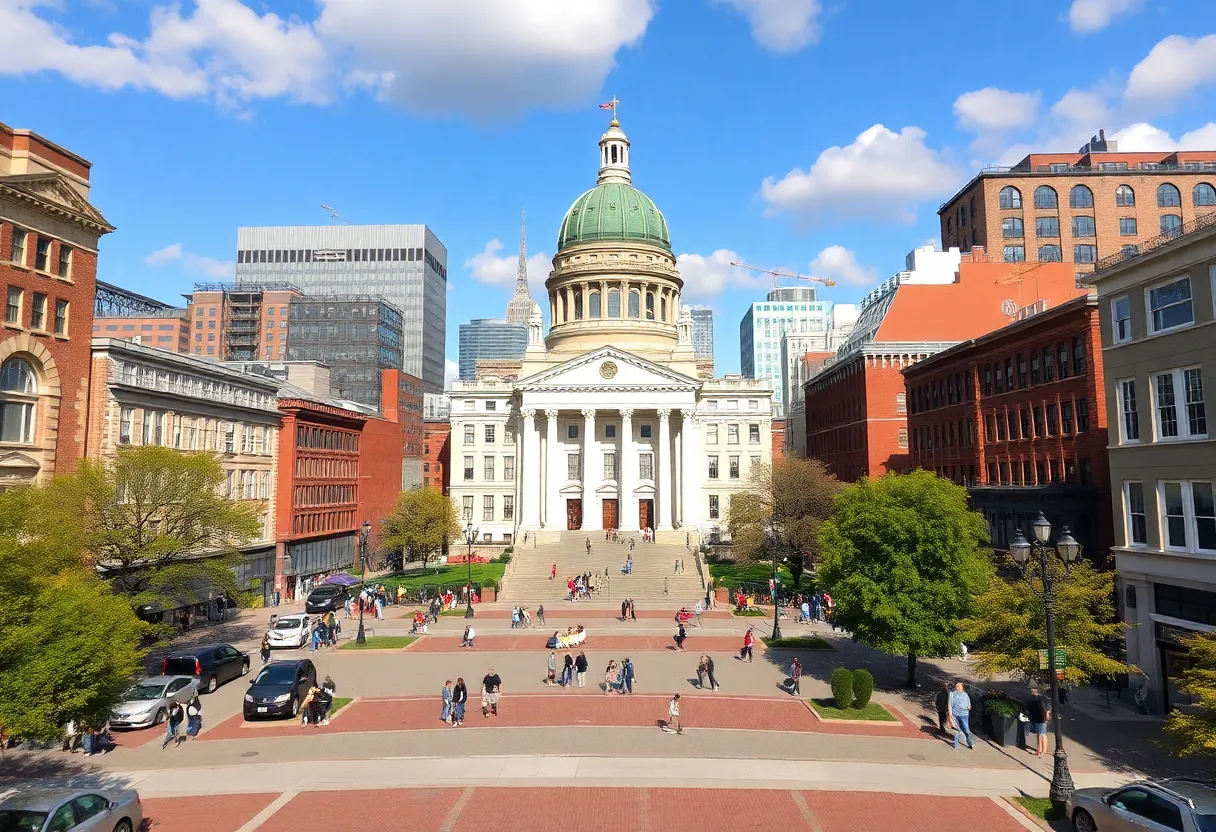News Summary
Boston prepares for a contentious mayoral election as incumbent Michelle Wu faces off against challenger Josh Kraft. The election includes emerging issues like housing, immigration, and public safety. Wu emphasizes her affordable housing initiatives while Kraft proposes a different approach to rent control and public safety. Polls show Wu leading, but concerns about affordable housing persist, complicating the election landscape.
Boston is gearing up for a competitive mayoral election as incumbent mayor Michelle Wu seeks reelection against challenger Josh Kraft. The election, scheduled for November 4, 2025, will begin with a non-partisan preliminary contest on September 9, 2025, to narrow the candidate field to two. Wu, who has held office since 2021, is facing a challenge from Kraft, a philanthropist with no prior political experience and the son of New England Patriots owner Robert Kraft.
Kraft’s background includes a 30-year tenure at the Boys & Girls Club of Boston, where he served as president and CEO for 12 years until 2020. While Wu and Kraft are the leading candidates, they are joined by community organizer Domingos DaRosa and retired police officer Robert Cappucci.
As the campaigns heat up, key issues are emerging, including housing, immigration, infrastructure, and public safety. Wu boasts that her administration has created more affordable housing than any other since 1998 and proposed a rent control initiative in 2023. However, this initiative was approved by the City Council but ultimately failed to gain support in the state legislature. In response, Kraft has put forward a plan to implement an opt-in rent control system for landlords, which Wu has criticized as “fake rent control.”
Wu is also a strong advocate for the Boston Trust Act, a sanctuary policy for immigrants, arguing that it has positively impacted public safety. Kraft has also supported the Trust Act and expressed opposition to former President Trump’s mass deportation plans, yet his connections to his father’s political affiliations raise questions about his campaign’s authenticity.
Another point of contention is Wu’s approach to bike infrastructure. Following criticisms regarding the speed of bike lane installations, she has announced a review of street changes made over the past three years. Conversely, Kraft has opposed new bike lanes and promised to halt their construction during his potential term as mayor.
Wu’s administration has also focused on addressing homelessness, particularly by clearing encampments at Melnea Cass Boulevard and Massachusetts Avenue, while connecting individuals with housing and services. In contrast, Kraft has proposed a plan that includes increased police presence in these areas, focusing on enforcement rather than social services.
Poll results indicate that Wu currently holds a significant lead, with approximately 53% of respondents supporting her compared to 21% backing Kraft. Wu has a job approval rating of 61%, while 37% of those surveyed disapprove of her performance. Her popularity appears to remain intact despite national dissatisfaction, as many voters believe Boston is moving in the right direction.
However, Wu faces criticism concerning affordable housing, particularly as housing production has sharply declined since she took office. New construction figures for 2023 were the lowest since 2011. Kraft attributes this downturn to Wu’s affordable housing requirements, claiming they make new development unviable. To counter this, Wu has instituted a $110 million Housing Accelerator fund aimed at incentivizing the construction of housing for lower and middle-income families.
Another arena of competition involves the planned renovation of White Stadium in Franklin Park, with both candidates presenting differing views on the funding and public benefit of the project. This situation is further complicated by a potential new soccer stadium for the New England Revolution, associated with the Kraft family’s influence in the region.
Both candidates remain focused on addressing crucial resident concerns as they put forth their visions for the future of Boston. While Wu’s track record boasts progressive policies, Kraft’s campaign leverages his philanthropic background and family influence, raising critical debates about the city’s direction and leadership.
Deeper Dive: News & Info About This Topic
HERE Resources
Josh Kraft Proposes Comprehensive Reentry Plan for Returning Citizens
Boston City Council Proposes Regional Fund for Mass. and Cass Crises
Boston’s Nightlife Scene Set to Thrive in 2025
Former Boston City Councilor Faces Forfeiture Over Kickback Scheme
Massachusetts Legislature Passes Healthcare and Transparency Rules
Boston Mayoral Race Heats Up: Wu and Kraft Debate Key Issues
Trump Nominates Joshua Dunlap to U.S. Court of Appeals
Boston City Councilor Resigns Amid Corruption Charges
Investigation Clears Boston Economic Chief of Wrongdoing
Boston Police Sergeant Retires Amid Assault Investigation
Additional Resources
- Boston.com: Mayoral Election Issues
- Google Search: Boston mayoral election 2025
- Wicked Local: Wu Leads in Poll
- Wikipedia: List of mayors of Boston
- Boston 25 News: Mayoral Debate
- Encyclopedia Britannica: Politics
- Boston Globe: Wu-Kraft Fact Check
- Google News: Michelle Wu

Author: STAFF HERE BOSTON WRITER
The BOSTON STAFF WRITER represents the experienced team at HEREBoston.com, your go-to source for actionable local news and information in Boston, Suffolk County, and beyond. Specializing in "news you can use," we cover essential topics like product reviews for personal and business needs, local business directories, politics, real estate trends, neighborhood insights, and state news affecting the area—with deep expertise drawn from years of dedicated reporting and strong community input, including local press releases and business updates. We deliver top reporting on high-value events such as Boston Marathon, Head of the Charles Regatta, and Boston Harborfest. Our coverage extends to key organizations like the Greater Boston Chamber of Commerce and Associated Industries of Massachusetts, plus leading businesses in finance, biotech, and insurance that power the local economy such as Fidelity Investments, Biogen, and Liberty Mutual Insurance. As part of the broader HERE network, we provide comprehensive, credible insights into Massachusetts's dynamic landscape.





